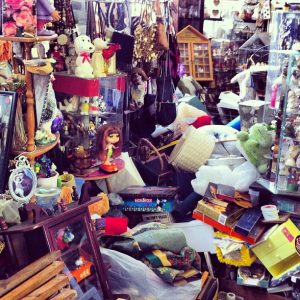You have a house full of stuff that is very near and dear to you. You find your house comfortable and pleasant to live in, but some of your family members do not agree. Now you are beginning to wonder if you might be a hoarder. How could you know?
An experienced professional is the most qualified person to determine whether you suffer from a hoarding disorder or not. But there are certain signs you can look for that might suggest you need to reach out for help. Those signs are encapsulated in a series of five questions that you can ask yourself as soon as you finish reading this article.
Here they are:
1. Is movement inside my home restricted?
Sometimes there is a fine line between having a cluttered home and being a hoarder. Clutter can make moving around your house difficult, but hoarding makes it nearly impossible. So ask yourself how restricted your movement actually is.
If you find you have a single, narrow pathway leading from the front door to the kitchen, for example, chances are you have a hoarding problem. Hoarders typically continue accumulating possessions until their houses are so full they only have a limited amount of space to move around.
2. Does my stuff prevent me from cleaning?
Regular cleaning is a normal part of daily life. When was the last time you cleaned your house? More importantly, does the sheer volume of stuff you have in your home prevent you from doing routine cleaning tasks like wiping down the counters, dusting the furniture, vacuuming the carpets, and sweeping the floors? If so, you may be a hoarder.
In the most extreme cases, a lack of cleaning can lead to pest infestations. We are talking about cockroaches, ants, and rodents here. A pest infestation only makes cleaning problems worse by adding to the mess.
3. Do thoughts of discarding my stuff cause stress?
A common symptom exhibited by hoarders is elevated stress levels when they start thinking about discarding some of their stuff. If the very thought of throwing something away agitates you, that is a warning sign. Overwhelming feelings of anxiety attached to thoughts of cleaning out your home is a dead giveaway that you are a hoarder.
4. Do I have access to tables and countertops?
One of the earliest things to go in a hoarding situation are tables and countertops. In other words, hoarders begin stacking things on those open spaces first. They only move to shelves, other furniture pieces, and the floor when tables and countertops are full. If you cannot get to tables and countertops because they are covered with stuff, it is a good bet you have a hoard problem.
5. Do friends and family to avoid visiting?
It is not unusual for hoarders to live isolated lives simply because their friends and family members no longer care to visit. Why do people behave this way? Because they view the hoarder’s house as uncomfortable, unsanitary, and possibly even unsafe. They do not want to endanger their own well-being by visiting.
Perhaps family members and friends have tried to encourage you to get help for a hoarding problem. Such advice, combined with the fact that they don’t want to visit you anymore, is a pretty clear indication you need to reach out for help.
My Divine Concierge assists families in resolving hoarding issues. We can help clean up, clear out, and restore the client’s home to livable condition, all the while teaching the client key strategies for avoiding a repeat situation. If you need help resolving a hoarding issue, please feel free to contact us.

